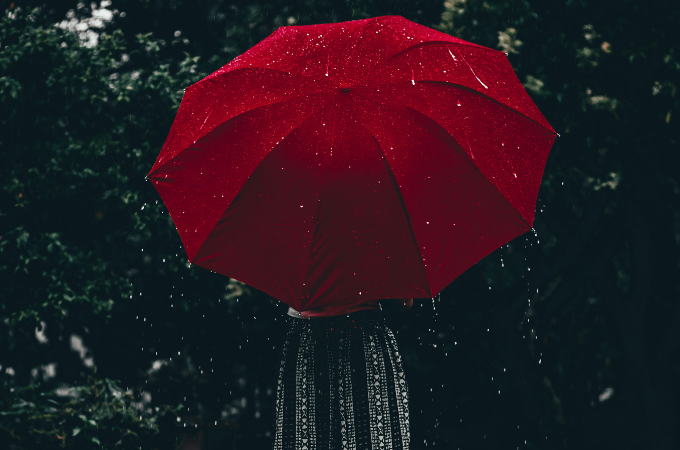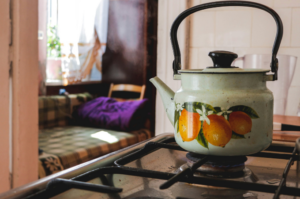
My dad has had a stroke, and the toughest part is being away from him. I’m across the ocean, far from the doctor’s fuss and hospital drama. My mother insists it is better this way, says I’m too impatient to handle what’s happening. But is it really? When I insist on traveling home, they make me speak with him on the phone, he tells me, with a sad slur in his voice, “Don’t come home, everything will be fine, and don’t cry.” In the history of telling people what to do or not do, when has anyone ever not cried because they were told not to do so? Someone said even the sky cries. You call it rain; the sky calls it therapy.
Since my sister sent me the picture of him lying on the floor unable to get up, I’ve dreaded every time my phone rings. What if it’s the call? I jerk awake in the middle of the night, checking my phone for messages from home. It’s as if I’m holding my breath, waiting for the news, and that’s a terrible thing to do.
I feel awful for holding my breath because I know I can only truly exhale when the end comes or if, by some miracle, he wakes up one morning, healed of aging. But feeling awful is just one piece of it; I’m trapped in a blend of grief, fear, and hurt. It’s as if there’s a fresh wound in my soul that tears open every time my sister sends another picture of Dad sipping drips through his veins, an oxygen mask shielding his face as he lay on a bed in adult-sized diapers.
If you’ve ever known a very active man, a man who would climb ladders to fix the rooftop, build you a chair from scraps because you wanted one, draw art on the fence of your one-story home, teach you how to paint, how to sew, how to pound yam, how to make moi-moi in carefully tied nylon bags so they don’t burst in the pot on fire—if you knew this, you’d understand why seeing him lay nearly lifeless on a hospital bed feels intractable.
And being in another country makes it even harder. Home often appears like a bouquet of flowers seen from a glass. No scent, no touch.
***
I have only a few pleasant memories of my father. When I was say five or six, I remember sitting with my big sister in the front garden. Dad wore his brown shirt patterned with little flowers and that magical chest pocket where groundnuts seemed to appear out of nowhere. He’d ask us simple math questions like, “What’s 2 + 2?” and, if we answered right, he’d reach into the miraculous groundnut pocket and hand us a piece of roasted groundnut. For a long time after he left, I wanted to go back to that garden.
There was also Orheptal, the blood tonic that was popular in the early 2000s. My big sister and I loved it and fought over who would go first to get a taste of that wonderful, iron-heavy syrup, thick as the blood of Jesus. We had a little song, Orheptal, Orheptal, Orheptal to ju Orheptal lo, which reflectively, makes no sense. When Dad left, we switched to De-deon. Orheptal just didn’t taste the same without him.
The first time I had ice cream was on my fifth birthday. Dad asked me what I wanted, and I said I wanted ice cream, like all my friends had. That day, he went from Abule Egba to Agege, where the closest Mr. Biggs was, to buy me ice cream and by the time he returned, it had melted, but I enjoyed every bit of it. Ice cream served with love though melted, remained iced in my heart. I remember spilling it when I tried climbing the window grille with my melting cup of ice cream. It never occurred to me then that a cup of melted ice cream was all the love he could give before he left.
One night when I was six, just after my little brother was born, my sister whispered to me that she had heard our parents talking about something big. “Daddy is leaving.” After he left, Mummy told us to tell anyone who asked that he had travelled to Ghana as opposed to the United States where he truly was.
***
I was only six when Daddy left, and my little brother was just a few months old. At first, the house was quiet. Sometimes, I’d wander into his darkly lit, empty room, struck by how silent it was. My birthdays were never the same. They became haunted with tears and a loneliness I was too young to understand or express. My mother would jokingly ask if I was possessed, and why I was crying like an egbére. In hindsight, the crying was a heave to live, a mass of anguish expelled for a father who left. I was too young to understand that he had traveled, not left.
Not that making that distinction would have changed anything. Soon, his daily calls faded to weekly, then monthly, until finally, it was, “Tell your (mum) kids to never call me again.” Why? That’s a story for another time; maybe not even mine to tell. But that doesn’t make it hurt less. Spending your formative years without a father breaks you into pieces you spend a lifetime trying to put back together.
Those birthday tears that spilt for reasons I couldn’t explain, the tears that came every time my mother would leave the house without me, the scathing loneliness that drove me to Telenovelas and Harlequin novels because I was subconsciously searching for a world where love stayed, where fathers didn’t leave. All of it makes sense now. My father left and didn’t return until I was twelve.
***
The night he came back, I was just recovering from a bout of malaria. I remember the untypical, loud bang on the gate. My mom went to see who was there. I heard a masculine voice call out, “Biola, Biola,” and she responded in shock, “Kayode.” My sister, who had gone with her, ran upstairs to me. “Dami, Daddy is back.”
I stood at the top of the stairs, watching as a face I’d almost forgotten reemerged from memory. He came up the stairs, a man carrying only a black polythene bag holding the scraps of his crushed dreams, with his feet pounding the stairs. He drew me into a crushing hug.
My father had returned. He had been sent back.
***
The man who returned had my father’s face and body, but he wasn’t my father. The man who left isn’t the one who came back. This man isn’t the one in the photos that hung on our living room walls. He isn’t the one from the garden, the one who made me a chair and brought me ice cream.
I hate America for whatever it did to him. What did you do, America? My mother sent you a man who treasured his kids, but you returned someone burdened by the weight of his crushed dreams on his fingers, someone who painted that weight on the canvas of our body. How did I go from wandering into his room just to remember his scent to hiding in my mother’s wardrobe, away from his rage? America, what have you done?!
Those days are etched into my mind, as clear as the spelling of my name. I remember it all—whether it was me, my mother, my sister, or my brother—it made no sense that the kindest man I knew had become the monster you run from in nightmares. I remember electric jugs flying across the room, the sound of a thick leather belt crashing against my flesh, the ambiguous English words that felt like missiles like, “stupid ignoramus.” To him, I was “a rebellious teenager whose overconfidence is satanic.”
***
If you’re wondering what he meant by “overconfidence,” it was that I didn’t know how and when to hide my lips inside my socks, when to keep what I was thinking to myself, when to obey. One time, he was painting the kitchen, using a wooden plank as a ruler to draw a straight line on the wall. It was funny to me. I genuinely found it clever, so I said, “Daddy, you are funny o.” The next thing I knew, I felt three swift lashings on my legs. Telling an adult he was funny, he said, was tantamount to an insult.
My favorite chore is washing dishes. It’s my escape from the world around me, a mindless task I can get lost in. I remember one day I took the dishes out to the balcony because the kitchen sink was clogged. My father came in and told me to go back to the kitchen. I didn’t want to. I’d already set everything up and was ready to sink into my thoughts. So, I stomped into my mother’s room, mumbling, “Mummy, daddy won’t let me wash the plates–” Before I could finish, he stormed in and began his art of kicks and punches, calling me a foolish child for “reporting” him to my mother. Did I think she was going to do anything? That night, his words painted another line between us. What he didn’t understand was that I didn’t trust him. I trusted my mother. I went to the adult I trusted.
Once, I looked him straight in the eyes and told him I wouldn’t do his laundry anymore because he never said, “thank you.” Not to me, not to my mum, not to any of my siblings. He didn’t beat me then. He just looked at me in shock.
Perhaps, I should thank America. Because I found my voice, even though he tried to beat it out of me. And when you’ve been beaten so many times, you start to see defiance as a right. You already know the consequences. Beating dares you to be more rebellious.
***
My father is a hard man. My father is a hard man to love. My father is a hard man to love, and he is the man who has hurt me the most. I am only writing this because I am a postcolonial, contemporary African woman whose trauma, complicated by migration, is an outcome of moving from one struggle to another without a system for grieving and healing; who is lucky enough to be able to translate my pain into words.
I have only just begun to forgive him. Not only because he’s ageing, but because forgiving is part of my healing. I know, though sometimes I struggle to believe it, that grief made him what he is. I remember him from the garden, and I know he is capable of love. I am trapped in this ambivalence of love and hate, healing and trauma, presence and absence, trying to make sense of all the world has handed me.
Sometimes my mother complains about caring for him, but she doesn’t leave. She says she remembers who he was when she married him. I tell her she can go if she wants to—the kids are grown now. We used to be her reason to stay. But she doesn’t leave. I don’t blame her. Life is messy; relationships are messier; family is the messiest of all. Sometimes we choose forgiveness, sometimes we don’t. Each person knows their cross and bears it.
This is where I stand: if my mother leaves, I will love and support her. She has tried.
If she stays, I will love and support her. It’s her choice.
If my father lives, I will keep demanding that he treat us better. I’ll remind myself that his failings as a father are not my fault, and I can heal from what he’s done.
If he doesn’t, I will mourn him honestly. I will not paint him as perfect; I will say he was broken in many ways. But he was my father, and I loved him. That, in the end, is why I grieve.
Photo by Aline de Nadai on Unsplash










COMMENTS -
Reader Interactions